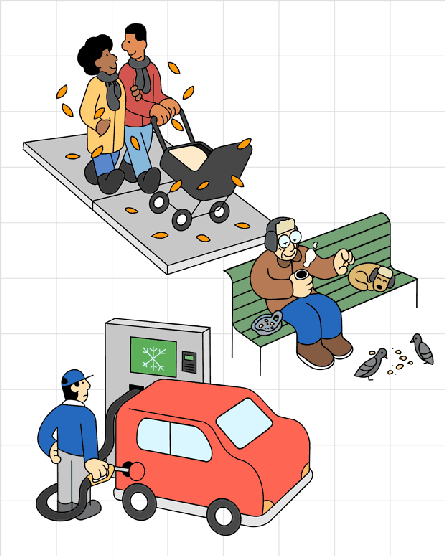The chancellor, Rachel Reeves, has pressed the button tax and benefits changes that will have an impact on the pound in your pocket. Through a range of scenarios we explore what it means in financial terms.
Some figures rounded up to the nearest pound. In some cases different rates apply in Scotland.

Single person of working age

This year someone earning the UK’s typical (median) wage of £37,500 will pay £4,986 in income tax and £1,994 in national insurance contributions (NICs). This results in a monthly take-home pay of £2,543 after tax, or £30,520 a year.
Traditionally tax brackets keep pace with inflation but they have been frozen in cash terms since April 2021 meaning as wages rise, particularly in times of high inflation, people pay tax on a bigger proportion of their income. However Reeves promised tax bands would be unfrozen from 2028-29.
A 2% pay rise due in April ups our worker’s salary by £750 to £38,250. As a result, their income tax bill goes up by £150 to £5,136, and NICs by £60 to £2,054. In the 2025-26 tax year their take-home pay will be £2,588 a month after tax, or £31,060 a year.
Pensioner

Once his full new state pension is combined with payments from a private one, he has a gross income of £19,000. From this he pays £1,286 in income tax. He no longer qualifies for the winter fuel payment, which shaved £200 from his budget this winter, and he will continue to miss each year. He benefits from the “triple lock” so his full state pension will rise by 4.1% or £9.05 to £230.25 a week, from April 2025, adding £470.60 to his annual income before tax. The tax bill on that is £94.12 leaving him an extra £376.48 in the 2025-26 tax year.
Low income pensioner couple

As they are now in their late 70s, the couple receive the basic state pension. Their combined income is less than the £332.95 (£218.15 for a single person) a week, or £17,313 a year, standard minimum guarantee so they receive a pension credit top-up and qualify for the £200 winter fuel payment. Next year the “triple lock” sees the minimum guarantee increase by 4.1% or £13.65 to £346.60 (£227.10 for a single person). This works out as an extra £709.80 a year for couples and £465.40 for singles.
High earners

She is a private equity executive and is due to receive a £1m payment for her share of deal-making profits known as “carried interest”. At the moment she would pay capital gains tax (CGT) on carried interest at 28%, which is £280,000. However, the rate on the earnings will rise again to 32% in April 2025. They have two children at private school at a cost of £26,000 a year each. From 1 January, VAT at 20% will apply to fees so, if the school adds on it on in full, the annual bill for this will rise by more than £10,000.
Wealthy family

This family have been doing some serious planning to reduce the inheritance tax (IHT) bill that the younger generation could face. They own a house worth £800,000 as well as shares. Current rules mean the married couple can combine allowances to pass on up to £1m tax-free (including their home) to their offspring. However, from 2027 their children can no longer inherit their £700,000 undrawn pension pot tax-free and will have to pay IHT on it. They also own £100,000 of shares in smaller companies listed on the Aim junior market (current rules exempt Aim shares held for at least two years from IHT). From April 2026 Reeves has cut this relief to 50% – so they could be looking at a bill of £20,000.
Business owner

This successful entrepreneur set up and runs a business valued at £2m and hoped to keep it in the family. Under current rules, if they die it would not be subject to inheritance tax (IHT). However, changes to business relief mean that from April 2026 his children will have to pay IHT on anything over £1m at an effective rate of 20%, which is £200,000. If he opted to sell instead, the changes to capital gains (CGT) announced and effective immediately mean this bill has increased by £40,000 to £340,000 this year. The rates ratchet up again in April 2025 and 2026 when the bill would hit £380,000 and £420,000 respectively. He also holds a portfolio of listed shares and is sitting on a gain of £100,000. If he had sold up pre-budget he would have paid a £20,000 CGT bill. As of budget day, his bill has increased by £4,000 to £24,000.
Young family

Our parents are both employed with a combined income of £75,000. Until this year they repaid half their child benefit (worth £25.60 a week for the eldest or only child – going up to £26.05 next April) because the higher earner is paid a salary of £55,000. However in April the starting point for repaying it was upped to £60,000. The couple want to get on the property ladder but the government did not extend the stamp duty holiday for first-time buyers, which expires on 31 March (it was increased from £300,000 to £425,000 and is due to revert back). They will miss out on a saving of up to £6,250 if they buy in England or Northern Ireland after that date.
Motorist

In a budget thin on rabbits, one surprise move was the chancellor’s announcement that a temporary 5p cut in fuel duty would remain in place. “While the cost of living remains high and with a backdrop of global uncertainty, increasing fuel duty next year would be the wrong choice for working people”, Reeves said. The current fuel duty rate for petrol and diesel, which includes the 5p cut, is 52.95p a litre. The cut is saving drivers about £130 a year according to the price comparison site Confused.com.
Single parent

The family receives universal credit (UC) and can expect their payments to rise by just 1.7% next April (a number of benefits, including UC, are increased each tax year in line with the cost of living figure for the previous September). However, there was some good news. The government has introduced a new fair repayment rate that reduces the level of debt repayments that can be clawed back from a household’s UC payment each month from 25% to 15% of their standard allowance. Those who benefit will gain an average of £420 a year.
-
Illustrations by Travis Constantine
-
Tax and national insurance calculations provided by accountants Blick Rothenberg.

.png) 2 months ago
20
2 months ago
20













































